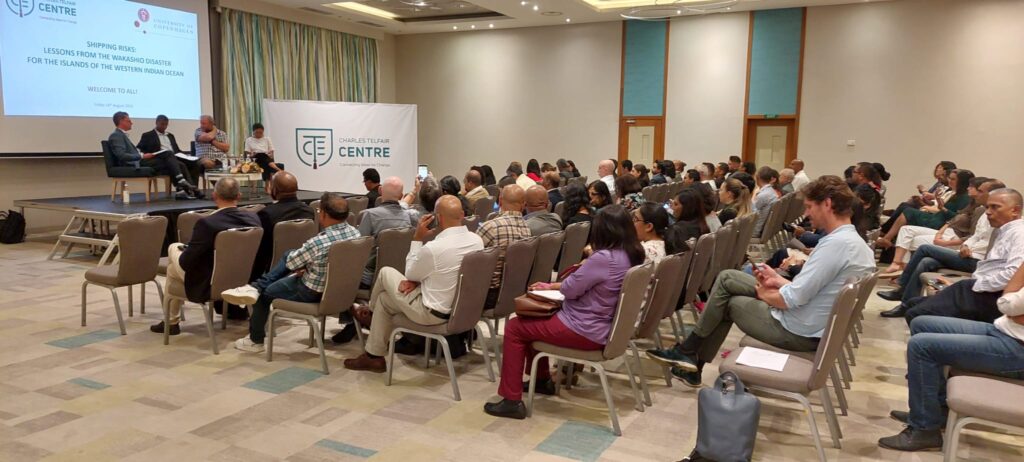The Charles Telfair Centre, in partnership with the University of Copenhagen and the SafeSeas network for maritime security research, hosted a public event on “Shipping Risks: Lessons from the Wakashio for Western Indian Ocean Islands” on Friday, August 18, 2023 in Mauritius.
Over 100 guests attended the event, which showcased the latest research on shipping risks and the lesson from the 2020 Wakashio oil spill. Notably, Mauritius is one of the most vulnerable countries in the world to harms from shipping, given the major shipping lane off its shore.

The forum provided a platform for engaging discussions on solutions available to high-risk countries such as Mauritius. Revisiting the lessons from the Wakashio oil spill, the event discussed solutions, such as better integrated response mechanisms at national and regional level, the inclusion of civil society in disaster preparedness, and how Mauritius can reduce risks through surveillance and stronger law enforcement in the Exclusive Economic Zone.
The Wakashio disaster was caused by a ‘string of failures’ – a series of mistakes, oversights, miscommunication, and lack of expertise that together allowed the disaster to unfold. As Mauritius is at high risk, and another accident can happen tomorrow, solutions must stop the next string of failures.
The forum featured a workshop and a public discussion with speakers such as Professor Christian Bueger (University of Copenhagen), Mr. Raj Mohabeer (Indian Ocean Commission), Dr. Vonintsoa Raffaly (University of Copenhagen), and Mr. Sébastien Sauvage (EcoSud).
Lessons from an environmental disaster
In the first part of the event (workshop), participant discussed the scope of shipping risks in the Western Indian Ocean and different surveillance, law enforcement, legal and regional options for improving resilience.
Participants agreed that some of the lessons from the Wakashio disaster have been learned and let to revised instruments and better disaster preparedness. However, continuous and focused efforts are required to tackle everyday shipping risks including container losses and smaller pollution incidents.
Participants also highlighted that given the growth of shipping activities and extreme weather from climate change, future shipping accidents off the shore of Mauritius are extremely likely. More must be done to ensure that any future accident does not evolve into a large-scale environmental emergency. The future of the Mauritian economy, society and environment is at stake. Mauritius must also lead on this issue in the region, and on a global level.
Towards prevention and better preparedness
A key message in the second part of the event (Public Forum) was the need to move beyond attributing blame for the Wakashio disaster, recognizing the broad scope of shipping risks, and work towards preventing them.
Mr. Raj Mohabeer emphasized that the states in the region have weak capacities and must pool resources for marine safety and law enforcement, surveillance, and responses. “No state can deal with a disaster of the scale of Wakashio on its own”. Since Wakashio the regional maritime security structures build and managed by the Indian Ocean Commission (know as MASE) have made great progress, but countries must improve and exercise their contingency plans. More donor support is needed.
Dr. Vonintsoa Rafaly stressed that Mauritius and other states in the region would benefit from using the full potential of instruments that international law provide. In particular, this comprises more pro-active measures in limiting shipping in the Exclusive Economic Zones. She also argued that the region requires a standing legal advisory body of independent legal experts and must be more active within international organizations, such as the International Maritime Organization, or the United Nation Environmental Programme.
Mr. Sébastien Sauvage stressed that the damage caused by the MV Wakashio oil spill is still severe, even if it is often not immediately visible. The disaster is not over, and its impact continues. Preventing further incidents has to be a priority. He argued that the nation would have had much more to gain if we were united in the face of this common enemy.
Civil society organizations are at the forefront of marine protection and social cohesion, they are likely to be the first responders in the event of a pollution incident. They must receive regular training and integrate their experience into the implementation of a national contingency plan.
The panel discussion, moderated by Professor Christian Bueger (Copenhagen), allowed guests to explore these issues in depth.
Key solutions for Mauritius and other high risk states
The key takeaways from the discussion included:
- Mauritius, along with regional neighbors Madagascar and Sri Lanka, is a high risk country. It is one of the most vulnerable countries in the world to shipping risks.
- Shipping activity in vicinity to Mauritius has more than tripled over the past decade and is expected to continue to grow. Another accident can happen tomorrow.
- Shipping risks include illegal activities (such as release of chemicals), unreported activities (such as accidental container losses), unregulated activities (such as new forms of fuel) and disasters.
- Integrated risk mitigation must include close surveillance of shipping, strong law enforcement operations, and disaster response strategies.
- The contingency plan of Mauritius must ensure broad coordination, but also improve the speed by which decisions can be taken.
- The region must pool its capacities, both in terms of expertise, as well as surveillance, law enforcement and response equipment.
- Civil society organizations are first responders and must be supported in this role.
- More diplomatic efforts are required to tackle shipping risks on a regional and international level. Mauritius should play a global leadership role for high-risk countries.

1 thought on “Shipping risks: Lessons from Wakashio disaster for island states – Event Summary”
Comments are closed.